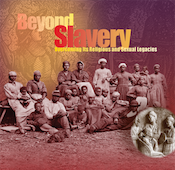Beyond Slavery
Explore the Conference
Explore the Conference by Subject
Slavery in Christian, Jewish, and Muslim Scripture and Religious Law
Christianity, Religion of the Slaveholders and the Enslaved
Sexual Assault and Exploitation Under U.S. Slavery and Jim Crow
How Slavery Has Shaped Our Understandings of Marriage and Friendship
Slavery, Violence, and the State
Beyond Slavery:
Overcoming Its Religious
& Sexual Legacy
Fay Botham:
Anti-Miscegenation Statutes: Roman Catholic and Protestant Theologies of Marriage and Race
Is the right to marry the person of one's choosing a human freedom? Does the state have a right to limit that choice? Historically, bans on interracial marriage in the United States grew from a sexual ethics rooted in Christian beliefs about marriage, race, and sexuality, and nurtured in a slaveholding society. The context of slavery meant that these laws contained fundamentally racist ideas about black male and female sexuality, and fundamentally sexist ideas about girls and women of all races. As we continue to struggle against racism, sexism, and (religious) heterosexism, knowledge of this history can guide us in thinking about the role of the state in private decisions. It raises useful questions about the proper relationship between religion and state, and specifically about the appropriateness of biblical influences on American law and public policy, particularly in a nation that purports to affirm no particular faith or religious tradition. A sexual ethics rooted in the moral principles of mutuality, equality, and consent, rather than in biblical precepts, might be a productive way to discuss government policies regarding marriage today.
This video was recorded on October 15-16, 2006 as part of the conference, "Beyond Slavery: Overcoming Its Religious and Sexual Legacy." It was sponsored by the Feminist Sexual Ethics Project in the Near Eastern and Judaic Studies Department at Brandeis University.
